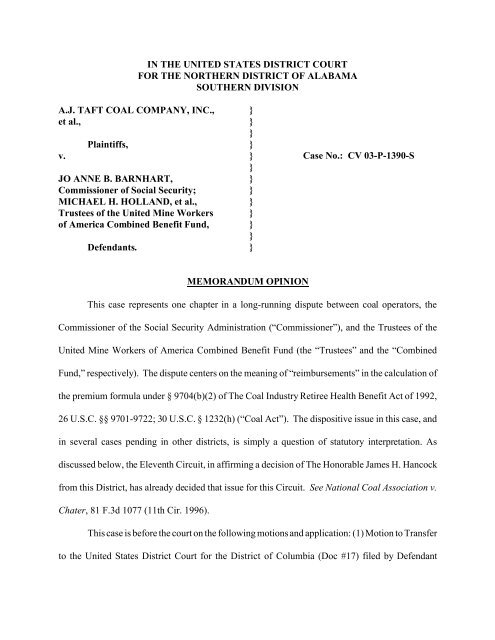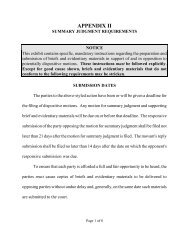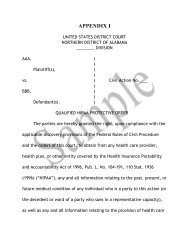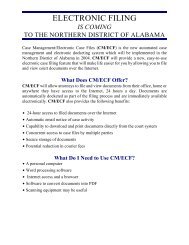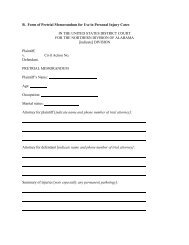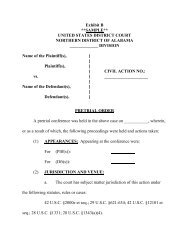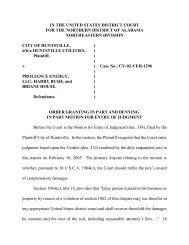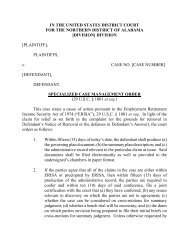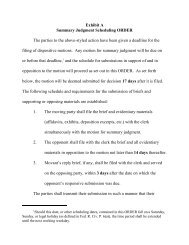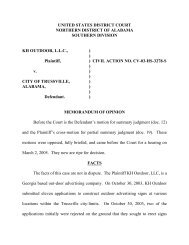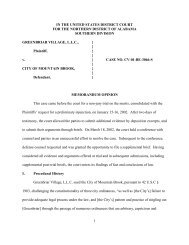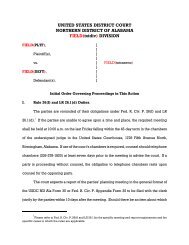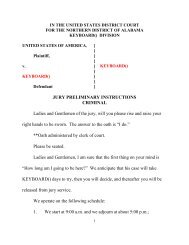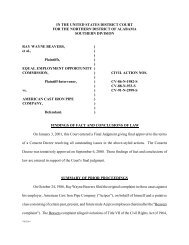Memorandum of Opinion - Northern District of Alabama
Memorandum of Opinion - Northern District of Alabama
Memorandum of Opinion - Northern District of Alabama
Create successful ePaper yourself
Turn your PDF publications into a flip-book with our unique Google optimized e-Paper software.
IN THE UNITED STATES DISTRICT COURT<br />
FOR THE NORTHERN DISTRICT OF ALABAMA<br />
SOUTHERN DIVISION<br />
A.J. TAFT COAL COMPANY, INC.,<br />
et al.,<br />
v.<br />
Plaintiffs,<br />
JO ANNE B. BARNHART,<br />
Commissioner <strong>of</strong> Social Security;<br />
MICHAEL H. HOLLAND, et al.,<br />
Trustees <strong>of</strong> the United Mine Workers<br />
<strong>of</strong> America Combined Benefit Fund,<br />
Defendants.<br />
}<br />
}<br />
}<br />
}<br />
}<br />
}<br />
}<br />
}<br />
}<br />
}<br />
}<br />
}<br />
}<br />
Case No.: CV 03-P-1390-S<br />
MEMORANDUM OPINION<br />
This case represents one chapter in a long-running dispute between coal operators, the<br />
Commissioner <strong>of</strong> the Social Security Administration (“Commissioner”), and the Trustees <strong>of</strong> the<br />
United Mine Workers <strong>of</strong> America Combined Benefit Fund (the “Trustees” and the “Combined<br />
Fund,” respectively). The dispute centers on the meaning <strong>of</strong> “reimbursements” in the calculation <strong>of</strong><br />
the premium formula under § 9704(b)(2) <strong>of</strong> The Coal Industry Retiree Health Benefit Act <strong>of</strong> 1992,<br />
26 U.S.C. §§ 9701-9722; 30 U.S.C. § 1232(h) (“Coal Act”). The dispositive issue in this case, and<br />
in several cases pending in other districts, is simply a question <strong>of</strong> statutory interpretation. As<br />
discussed below, the Eleventh Circuit, in affirming a decision <strong>of</strong> The Honorable James H. Hancock<br />
from this <strong>District</strong>, has already decided that issue for this Circuit. See National Coal Association v.<br />
Chater, 81 F.3d 1077 (11th Cir. 1996).<br />
This case is before the court on the following motions and application: (1) Motion to Transfer<br />
to the United States <strong>District</strong> Court for the <strong>District</strong> <strong>of</strong> Columbia (Doc #17) filed by Defendant
Trustees on July 1, 2003; (2) Motion to Dismiss, or, in the Alternative, to Transfer (Doc #31) filed<br />
by Defendant Commissioner on July 28, 2001; (3) Motion to Dismiss, or, in the Alternative, to<br />
Transfer (Doc #38) filed by Defendant Trustees on August 12, 2003; (4) Application for Preliminary<br />
Injunction (Doc #47) filed by Plaintiffs on September 30, 2003; and (5) Motion to Intervene as<br />
Plaintiffs (Doc #50) filed October 3, 2003.<br />
For the reasons stated below, the court makes the following determinations. Venue over the<br />
Commissioner is proper in this court pursuant to 28 U.S.C. § 1391(e)(3) because at least one plaintiff<br />
who resides in this <strong>District</strong> had a justiciable claim at the time <strong>of</strong> filing. However, the court finds<br />
that the claims <strong>of</strong> the plaintiffs in this case who reside in the Eleventh Circuit are now moot. The<br />
court agrees with the defendants that transfer <strong>of</strong> this case is appropriate under 28 U.S.C. § 1404(a),<br />
but disagrees that the <strong>District</strong> <strong>of</strong> Columbia should be the transferee court. The court instead finds<br />
it appropriate under § 1404(a) to transfer this case to <strong>District</strong> <strong>of</strong> Maryland.<br />
I. Background and Procedural History <strong>of</strong> this Case<br />
The Coal Act requires present and former coal operators, such as the plaintiffs in this case,<br />
to pay for the health benefits <strong>of</strong> coal industry retirees and their dependents. 26 U.S.C. §§ 9702,<br />
9704. Congress passed the Coal Act in 1992 to ensure that retired coal miners and their dependents<br />
and widows continue to receive the lifetime health benefits guaranteed by earlier collective<br />
bargaining agreements with coal operators. Before the Coal Act was passed, the two multi-employer<br />
health care plans that provided benefits to retired miners (the “Plans”) were operating at a deficit.<br />
The financial instability <strong>of</strong> the Plans led to a breakdown in labor relations, the cessation <strong>of</strong> operator<br />
contributions to the Plans, and an eleven-month strike by mine workers. National Coal Association<br />
v. Chater, 81 F.3d 1077, 1078-79 (11th Cir. 1996). In an effort to remedy the funding problems yet<br />
2
maintain a privately financed program, Congress consolidated the Plans into the Combined Fund<br />
with financing primarily provided by coal operators.<br />
A. “Reimbursements” under the Coal Act<br />
The amount operators must pay to the Combined Fund depends in part on the “per<br />
beneficiary premium” calculated by the Commissioner and adjusted annually for inflation. 26 U.S.C.<br />
§ 9704(b)(2)(B). Once the Commissioner calculates the formula, the Trustees, as fiduciaries, bill<br />
and collect the premiums from the coal operators. 26 U.S.C. § 9704(b)(2)(B).<br />
The premium formula is based on the costs incurred by the Plans in the last year before they<br />
were consolidated into the Combined Fund (“the Base Year”). Because the Plans contracted with<br />
the Medicare program for many years before consolidation, Congress decided that reimbursements<br />
received from Medicare should be subtracted from the Base Year costs. Thus, the baseline rate for<br />
the premium is the “aggregate payments . . . for health benefits (less reimbursements but including<br />
administrative costs)” made by the Plans during a base year beginning on July 1, 1991. 26 U.S.C.<br />
§ 9704(b)(2)(A) (emphasis added).<br />
The dispute in this case concerns the calculation <strong>of</strong> “reimbursements” received by the<br />
Combined Fund's predecessors. As the Eleventh Circuit explained:<br />
. . . . [Beginning in the base year, HHS] paid a predetermined amount per plan<br />
member per month, without regard to the amount <strong>of</strong> money that the [predecessor]<br />
plans actually spent for Medicare-covered services.<br />
. . . . [I]n the base year, the [predecessor] plans spent $156.8 million on<br />
Medicare Part B and related administrative expenses [and] received $182.3 million<br />
in risk-capitation payments for Medicare Part B services and related administrative<br />
costs, an amount that exceeded actual costs by $25.5 million.<br />
National Coal Association, 81 F.3d at 1079-80 (footnote omitted and emphasis added).<br />
3
The interpretation <strong>of</strong> the word “reimbursements” as it related to the initial surplus <strong>of</strong> $25.5<br />
million was the impetus for the litigation leading up to this case. The Secretary <strong>of</strong> Health and<br />
Human Services (“the Secretary”) 1 initially determined that the $25.5 million received in the base<br />
year should not be counted as reimbursements in the calculation <strong>of</strong> the baseline premium rate which<br />
determined all future years' premiums. See National Coal Association, 81 F.3d at 1080. As a result,<br />
the premiums paid by operators were approximately 10% higher (“the higher premium”) than they<br />
would have been had the Secretary determined that the term “reimbursements” included the<br />
additional $25.5 million and set-<strong>of</strong>f the baseline premium rate by that amount.<br />
B. The NCA Litigation<br />
In April 1994, eight coal operators and the National Coal Association 2 brought suit against<br />
the Commissioner before The Honorable James H. Hancock in the <strong>Northern</strong> <strong>District</strong> <strong>of</strong> <strong>Alabama</strong><br />
challenging the Secretary's interpretation <strong>of</strong> reimbursements. National Coal Association v. Shalala,<br />
1995 WL 1052240, No. CV-94-H-780-S (N.D. Ala. 1994) (“NCA”). The Trustees were not parties<br />
to that lawsuit. Judge Hancock determined that the Secretary’s methodology was flawed because<br />
the plain language <strong>of</strong> the Coal Act required the extra $25.5 million to be included in the calculation<br />
<strong>of</strong> reimbursements and ordered the Commissioner to recompute the baseline premium and all<br />
subsequent premiums accordingly (“the lower premium”). The Eleventh Circuit affirmed. National<br />
Coal Association, 81 F.3d at 1081-82.<br />
1<br />
A 1994 amendment to the Coal Act replaced the Secretary with the Commissioner. 26<br />
U.S.C. § 9706; Social Security Independence and Program Improvements Act, Pub.L. No. 103-296,<br />
§ 108(h)(9)(A), 108 Stat. 1464, 1487.<br />
2<br />
The suit was originally filed by the National Coal Association and seven coal operators and<br />
an eighth coal operator thereafter intervened.<br />
4
C. The Commissioner’s 1995 Recalculation<br />
In response to NCA, the Commissioner, who had by then succeeded to the responsibility for<br />
determining the per-beneficiary rate, applied the lower premium to all operators nationwide, not<br />
merely those operators who were either parties to the NCA litigation or residents <strong>of</strong> states within the<br />
Eleventh Circuit.<br />
D. The Holland I Litigation<br />
In 1996, the Trustees filed suit in the United States <strong>District</strong> Court for the <strong>District</strong> <strong>of</strong> Columbia<br />
challenging the Commissioner’s 1995 recalculation. Holland v. Apfel, 23 F. Supp. 2d 21 (D.D.C.<br />
1998) (“Holland I”). Subsequently, the National Mining Association (purportedly a successor <strong>of</strong> the<br />
National Coal Association) and seven <strong>of</strong> the eight NCA plaintiffs intervened as defendants. The<br />
<strong>District</strong> <strong>of</strong> Columbia <strong>District</strong> Court determined in February 2000 that the Secretary’s original<br />
calculation was correct and ordered the Commissioner to reinstate the higher premium rate.<br />
(Trustees’ July 1, 2003, Brief in Support <strong>of</strong> Transfer, at 11 and Exs. 13-14, 17, 19-20 thereto.)<br />
On appeal, the <strong>District</strong> <strong>of</strong> Columbia Circuit reversed the district court’s judgment upholding<br />
the Commissioner’s original higher premium interpretation. Holland v. Apfel, 309 F.3d 808, 819<br />
(D.C. Cir. 2002). The court further held that the <strong>District</strong> <strong>of</strong> Columbia federal courts were not<br />
“authorize[d] . . . to lift the existing Eleventh Circuit injunction as to the coal companies who were<br />
parties in the prior litigation,” id. at 815, and “vacated the <strong>District</strong> Court's injunction ins<strong>of</strong>ar as it<br />
purport[ed] to bind the Commissioner with respect to coal companies who had the benefit <strong>of</strong> the<br />
Eleventh Circuit judgment,” id. at 819.<br />
The D.C. Circuit also vacated the Commissioner’s 1995 recalculation which implemented<br />
the lower premium nationwide and “remanded” to the Social Security Administration for further<br />
5
justification <strong>of</strong> the nationwide premium. Id. at 819. 3<br />
E. The June 10, 2003 Premium Decision<br />
In response to the D.C. Circuit’s order that she provide justification for the nationwide<br />
implementation, the Commissioner indicated that she was unable to locate documents or<br />
decisionmakers who could answer why the agency had applied the NCA interpretation “nationwide.”<br />
(Letter from Social Security Administration in Baltimore, MD, dated June 10, 2003, at 2) (“June 10,<br />
2003 Premium Decision” or “Premium Decision”).<br />
Moreover, the Commissioner decided that the higher premium originally set by the Secretary<br />
was applicable to “those coal operators who were not parties to the National Coal litigation.”<br />
(Premium Decision, at 2) (emphasis added). This “different approach,” the Commissioner explained,<br />
was adopted “in light <strong>of</strong> recent litigation and the current financial condition <strong>of</strong> the Fund.” Id. Thus,<br />
the Commissioner made it very clear that the decision to apply the higher premium to all operators<br />
who were not parties to NCA was a direct result <strong>of</strong> the D.C. Circuit’s Holland I opinion. As she<br />
stated:<br />
Id.<br />
The recent D.C. Circuit opinion in Holland made clear that we are not required to<br />
apply the holding <strong>of</strong> the Eleventh Circuit to coal operators who were not parties to<br />
the National Coal litigation. Moreover, while considerations <strong>of</strong> fairness and uniformity<br />
remain important, the Fund's worsening financial condition makes it essential<br />
that the Fund be afforded all the premium revenues contemplated by the Coal Act.<br />
3<br />
The D.C. Circuit explained that further justification by the Commissioner was necessary<br />
because the court was uncertain whether the agency had mistakenly concluded that it was “compelled<br />
to adopt” nationwide “an interpretation that it did not prefer” or whether it had voluntarily done so.<br />
Id. at 816.<br />
6
F. Post-June 10, 2003 Premium Decision Litigation<br />
On June 11, 2003, the day after the Commissioner’s announcement that operators who were<br />
not parties to NCA are obligated to pay higher premiums, ninety-eight (98) coal operators filed this<br />
lawsuit in the <strong>Northern</strong> <strong>District</strong> <strong>of</strong> <strong>Alabama</strong> against the Commissioner and the Trustees. 4 The<br />
plaintiffs’ Amended Complaint in this case requests injunctive relief from the Commissioner’s 2003<br />
Premium Decision and a declaratory judgment regarding the correct premium amount under<br />
§9704(b) <strong>of</strong> the Coal Act. (See July 10, 2003, Plaintiffs’ Amended Complaint, Counts I-III.)<br />
Generally, the plaintiffs claim that the Commissioner’s 2003 Premium Decision violates § 9704(b)<br />
<strong>of</strong> the Coal Act and this court’s decision in NCA. (Id.) Of the ninety-eight (98) plaintiffs in this case,<br />
only four — A.J. Taft Coal Company, Inc., <strong>Alabama</strong> Electric Cooperative, Cowin & Company, Inc.,<br />
and U.S. Steel Mining Company, LLC, — are incorporated in <strong>Alabama</strong>. 5<br />
“Plaintiffs have chosen<br />
this forum because this <strong>District</strong> Court and the Eleventh Circuit previously have resolved the very<br />
statutory construction issue presented in this action. Therefore, this Court may rule summarily on<br />
this action.” (Plaintiffs’ July 16, 2003, Opposition Brief, at 2.)<br />
On June 12, 2003, the Commissioner filed a “Notice <strong>of</strong> Decision on Remand” with the D.C.<br />
4<br />
None <strong>of</strong> the plaintiffs appears to contend that it was a party in NCA, though thirty-eight (38)<br />
<strong>of</strong> them do claim that they are due the lower premium rate because they are “related” to one or more<br />
parties in the NCA litigation. (July 10, 2003, Plaintiffs’ Amended Complaint, 37-38.)<br />
5<br />
As discussed infra, only three <strong>of</strong> those companies reside in <strong>Alabama</strong> for venue purposes<br />
(A.J. Taft Coal Company, Inc., <strong>Alabama</strong> Electric Cooperative, and Cowin & Company, Inc.) and <strong>of</strong><br />
those three, only two have standing to sue because <strong>Alabama</strong> Electric Cooperative has no justiciable<br />
claim as it owes $0 in premiums. Therefore, only A.J. Taft Coal Company, Inc. and Cowin &<br />
Company, Inc. are properly counted for venue purposes. Although it appears from the plaintiffs’<br />
Amended Complaint that Drummond Coal Sales Inc. is also incorporated in <strong>Alabama</strong> (see July 10,<br />
2003, Plaintiffs’ Amended Complaint, at 16), at oral argument the parties corrected that error and<br />
represented that Drummond Coal Sales Inc. is, in fact, incorporated in Delaware.<br />
7
<strong>District</strong> Court attaching the June 10, 2003 Premium Decision. That same day, the Trustees filed a<br />
motion in the D.C. <strong>District</strong> Court to reopen the Holland I litigation. A few days later, the Trustees<br />
also requested leave to file an amended complaint in the D.C. <strong>District</strong> Court.<br />
On July 8, 2003, the D.C. <strong>District</strong> Court denied both <strong>of</strong> the Trustees’ motions on the ground<br />
that the court no longer had jurisdiction over the proceedings related to the D.C. Circuit’s remand<br />
to the Social Security Administration. The court instructed the Trustees to pursue any grievances<br />
against the Social Security Administration by filing a new lawsuit.<br />
One week later, the Trustees filed a second lawsuit in the <strong>District</strong> <strong>of</strong> Columbia against<br />
approximately 100 coal operator defendants (none <strong>of</strong> whom were parties to NCA, but many <strong>of</strong> whom<br />
are plaintiffs in this case). Holland v. A.T. Massey Coal Co., No. 03-1523 (filed July 15, 2003)<br />
(“Holland II”). In Holland II, the Trustees seek a declaration that the higher premium <strong>of</strong> the 2003<br />
Premium Decision is valid and that none <strong>of</strong> the named coal operators defendants are entitled to the<br />
lower premium applicable to NCA parties.<br />
When Holland II was filed, approximately seventy-three (73) <strong>of</strong> the operator-defendants<br />
named in that case were also plaintiffs in this case. Moreover, an additional thirty-eight (38) <strong>of</strong> the<br />
operator-defendants in Holland II – none <strong>of</strong> whom alleges <strong>Alabama</strong> residency – have moved to<br />
intervene in this action. (October 3, 2003, Motion to Intervene.)<br />
Two weeks after the Trustees filed Holland II, the Commissioner filed in this case a motion<br />
to dismiss or, in the alternative, to transfer the case to U.S. <strong>District</strong> Court for the <strong>District</strong> <strong>of</strong><br />
Columbia. In her brief in support <strong>of</strong> that motion, the Commissioner stated that “the assumption<br />
implicit in the 2003 Premium Decision was that [the Commissioner] was addressing only whether<br />
to adopt the Eleventh Circuit decision [in NCA] . . . outside the Eleventh Circuit. The 2003 Premium<br />
8
Decision thus . . . leaves undisturbed for Eleventh Circuit companies the lower premium rates<br />
established by NCA.” (Commissioner’s July 28, 2003, Brief in Support <strong>of</strong> Motion to Dismiss or<br />
Transfer, at 10) (emphasis added).<br />
According to the Commissioner’s brief, the lower premium rate which, as <strong>of</strong> the June 10,<br />
2003 Premium Decision applied only to the “parties to the National Coal litigation,” now applies<br />
to the broader group <strong>of</strong> “Eleventh Circuit companies.” The Trustees have represented to this court<br />
that, based on the Commissioner’s acknowledgment that the lower premium applies to all Eleventh<br />
Circuit resident companies, the Trustees have now dismissed from the Holland II litigation all<br />
companies who reside in the Eleventh Circuit. (See D.D.C. Notice <strong>of</strong> Dismissal filed Aug. 5, 2003,<br />
in Holland v. A.J. Taft Coal Co., et al., No. 03-1523.) The companies in this case who reside in the<br />
Eleventh Circuit are among those dismissed from Holland II. In response to the court’s questioning<br />
at oral argument held on October 21, 2003, the Commissioner filed a written concession that assures<br />
the lower premium rate “will remain in effect for all plan years for residents <strong>of</strong> the Eleventh Circuit”<br />
unless a higher rate is authorized by the Eleventh Circuit, the Supreme Court, or Congress.<br />
(Defendant Commissioner’s October 22, 2003, Response to Inquiry <strong>of</strong> Court.)<br />
II.<br />
Current Posture <strong>of</strong> this Case<br />
The Commissioner’s application <strong>of</strong> the lower rate to all companies who reside in the<br />
Eleventh Circuit is the basis for the defendants’ venue challenge in this lawsuit. The defendants<br />
argue that, because the Commissioner does not seek to enforce the higher premium against<br />
companies that reside in <strong>Alabama</strong>, Georgia and Florida, the Eleventh Circuit resident plaintiffs have<br />
no case or controversy with the defendants and thus cannot establish venue against the<br />
Commissioner in the <strong>Northern</strong> <strong>District</strong> <strong>of</strong> <strong>Alabama</strong> under 28 U.S.C. § 1391(e)(3).<br />
9
This Court now has before it ninety-eight (98) plaintiff coal companies who challenge the<br />
correctness <strong>of</strong> the Commissioner’s June 10, 2003 Premium Decision because they desire the lower<br />
premium calculation. There is a disagreement between the Eleventh Circuit and the D.C. Circuit as<br />
to whether or not the term “reimbursements” is ambiguous. Compare National Coal Association,<br />
81 F.3d at 1081-82 (finding that “reimbursements” is unambiguous on its face and affirming the<br />
district court’s mandate that the Commissioner apply the lower premium) with Holland, 309 F.3d<br />
at 425 (“If anything, the Eleventh Circuit’s opinion seems to confirm the statute’s ambiguity . . . .We<br />
can discern no plain meaning [<strong>of</strong> “reimbursements”] in this case, however.”).<br />
Although the circuits are split on this issue, it is clear that the result in this court is<br />
preordained. If the court were to reach the merits <strong>of</strong> this case, it would apply the lower premium<br />
consistent with the NCA decision because (1) it is bound by the Eleventh Circuit’s decision in that<br />
case and, in any event, (2) it believes the NCA holding is the correct one. It is equally clear that the<br />
plaintiff coal companies have chosen to bring suit in a forum that virtually guarantees the application<br />
<strong>of</strong> the lower premium rate and assures them victory.<br />
Although this case is pending in the Eleventh Circuit, the ninety-four (94) plaintiffs in this<br />
case who have a justiciable claim all reside outside the Eleventh Circuit. All four <strong>of</strong> the plaintiffs<br />
who reside in the Eleventh Circuit were billed at the lower premium rate and have no case or<br />
controversy with the defendants because, in light <strong>of</strong> the unequivocal representation <strong>of</strong> the<br />
Commissioner, they will continue to receive the lower rate absent a change in the law by the<br />
Eleventh Circuit, the United States Supreme Court, or Congress. (See October 22, 2003, Defendant<br />
Commissioner’s Response to Inquiry <strong>of</strong> Court; see also discussion infra Section III.A.) Moreover,<br />
the plaintiffs in this case who reside outside the Eleventh Circuit are entangled in the Holland II<br />
10
litigation currently pending in the D.C. Circuit, although thirty-eight (38) <strong>of</strong> the Holland II defendant<br />
coal companies have sought to intervene in this case. (See October 3, 2003, Motion to Intervene.)<br />
The Trustees have represented that if the lower premium applies to all operators for the remaining<br />
life <strong>of</strong> the Combined Fund, the resulting loss to the Combined Fund – and thus to benefits paid to<br />
retired mine workers and their beneficiaries and widows – totals several hundred million dollars.<br />
(See Trustees’ July 1, 2003, Brief in Support <strong>of</strong> Transfer, at 7 and Ex. 2 thereto.)<br />
Hence, as will be even more evident below, this case now involves a dispute between the<br />
Commissioner and Trustees on one hand, and, on the other, a number <strong>of</strong> coal operators (1) who do<br />
not reside in either the Eleventh or D.C. Circuits and (2) who were neither parties to the Eleventh<br />
Circuit’s NCA case nor the D.C. Circuit’s Holland I litigation. Nevertheless, the plaintiffs seek the<br />
“protection” <strong>of</strong> the NCA case and the defendants seek to transfer this case to Washington, D.C., in<br />
order to benefit from the Holland I decision.<br />
III.<br />
Discussion<br />
A. Venue in this Case Is Proper in the <strong>Northern</strong> <strong>District</strong> <strong>of</strong> <strong>Alabama</strong>.<br />
Both the Commissioner and the Trustees claim that this case is due to be dismissed or<br />
transferred because venue is improper as to the Commissioner in the <strong>Northern</strong> <strong>District</strong> <strong>of</strong> <strong>Alabama</strong><br />
under 28 U.S.C. § 1391(e). 6<br />
Because the plaintiffs have brought suit against the Commissioner <strong>of</strong><br />
6<br />
Apart from their argument that (1) the Commissioner is a Fed. R. Civ. P. 19 indispensable<br />
party to this action and (2) the case should be dismissed or transferred if venue is improper as to the<br />
Commissioner, the Trustees cannot present any improper venue motion <strong>of</strong> their own. First, even if<br />
the Commissioner was correct in arguing that venue is improper as to her by virtue <strong>of</strong> § 1391(e), that<br />
does not mean that venue is improper as to the Trustees for the same reason. Camp v. Gress, 250<br />
U.S. 308, 316 (1919); see also Goldberg v. Wharf Constructers, 209 F. Supp. 499, 503 (N.D. Ala.<br />
1962) (Lynne, J.) (“It is well settled...that the defense <strong>of</strong> improper venue is personal to the party to<br />
whom it applies ....”). Second, as discussed infra, the Trustees have not asserted that venue in the<br />
<strong>Northern</strong> <strong>District</strong> <strong>of</strong> <strong>Alabama</strong> is improper as to them.<br />
11
Social Security in her <strong>of</strong>ficial capacity, § 1391(e) is the appropriate venue statute for the claims filed<br />
against her in this case. It provides in relevant part:<br />
A civil action in which a defendant is an <strong>of</strong>ficer or employee <strong>of</strong> the United<br />
States or any agency there<strong>of</strong> acting in his <strong>of</strong>ficial capacity . . . may, except<br />
as otherwise provided by law, be brought in any judicial district in which (1)<br />
a defendant in the action resides, (2) a substantial part <strong>of</strong> the events or<br />
omissions giving rise to the claim occurred ... or (3) the plaintiff resides if no<br />
real property is involved in the action. Additional persons may be joined as<br />
parties to any such action in accordance with the Federal Rules <strong>of</strong> Civil<br />
Procedure and with such other venue requirements as would be applicable if<br />
the United States or one <strong>of</strong> its <strong>of</strong>ficers, employees, or agencies where not a<br />
party.<br />
28 U.S.C. § 1391(e). The plaintiffs claim only that venue is appropriate under § 1391(e)(3). (See<br />
Plaintiffs’ August 13, 2003, Opposition Brief, at 21.) 7<br />
1. Any Argument That Venue Is Improper as to the Trustees Has Been<br />
Waived.<br />
As a threshold matter, the court notes that § 1391(e) does not confer venue over the Trustees<br />
because they are nonfederal defendants. “[A] defendant” in 1391(e)(1) refers only to federal<br />
agencies and <strong>of</strong>ficers. Rogers v. Civil Air Patrol, 129 F. Supp. 2d 1334, 1338 (M.D. Ala. 2001);<br />
Lamont v. Haig, 590 F.2d 1124, 1128-1129 (D.C. Cir. 1978); Reuben H. Donnelley Corp. v. F.T.C.,<br />
580 F.2d 264, 266 (7th Cir.1978); see also H. Rep. No. 94-1656, at 19 (1976), reprinted in 1976<br />
U.S.C.C.A.N. 5109, 6139-40 (noting that venue determinations for federal and non-federal<br />
defendants are separate, even where they are joined in the same action); 15 CHARLES A. WRIGHT,<br />
7<br />
The parties concede that § 1391(e)(1) is not applicable because the Commissioner does not<br />
reside in the <strong>Northern</strong> <strong>District</strong> <strong>of</strong> <strong>Alabama</strong>. Although the court indicated at oral argument that it<br />
would entertain argument regarding venue under both §§ 1391(e)(2) and (e)(3), the plaintiffs<br />
declined to assert (e)(2) and indicated they stand only on (e)(3). Because the parties agree that<br />
§1391(e)(3) is the only possible basis for venue in this action, the court will focus its analysis on that<br />
provision.<br />
12
ARTHUR R. MILLER & EDWARD H. COOPER, JURISDICTION 2D, § 3815, 164-65 (1986). For venue to<br />
be proper over the Trustees in this court, they must satisfy “such other venue requirements as would<br />
be applicable if the United States or one <strong>of</strong> its <strong>of</strong>ficers, employees, or agencies were not a party.” 28<br />
U.S.C. § 1391(e).<br />
That being said, the court need not conduct an independent analysis <strong>of</strong> whether venue in the<br />
<strong>Northern</strong> <strong>District</strong> <strong>of</strong> <strong>Alabama</strong> is appropriate as to the Trustees under 28 U.S.C. § 1391(b), the general<br />
venue provision for cases involving federal question jurisdiction, because neither the Commissioner<br />
nor the Trustees raised as a defense improper venue under that section. See Fed. R. Civ. P. 12(h)(1);<br />
Lip<strong>of</strong>sky v. New York State Workers Compensation Bd., 861 F.2d 1257, 1258 (11th Cir. 1985)<br />
(finding that improper venue, unlike lack <strong>of</strong> subject matter jurisdiction which requires dismissal on<br />
the court’s own motion if not raised by the parties, is waived when a defendant files a responsive<br />
pleading or a Rule 12 motion failing to assert it). Accordingly, the court finds that any objection to<br />
improper venue over the Trustees has been waived and the court need only address venue under<br />
§1391(e). 8<br />
2. Venue Is Proper under § 1391(e)(3) If “A” Plaintiff Resides in this <strong>District</strong>.<br />
First, the Defendants claim that venue is improper under § 1391(e)(3) because that provision<br />
requires that all plaintiffs reside in the judicial district in which the claim is brought.<br />
For over thirty years federal courts have conclusively and consistently held that the statutory<br />
8<br />
As a practical matter, it is <strong>of</strong> no moment that the defendants waived any objection to<br />
improper venue over the Trustees given the court’s decision to transfer the case under 28 U.S.C.<br />
§1404(a) to the <strong>District</strong> <strong>of</strong> Maryland. Even if this court were to decide that venue was improper in<br />
the <strong>Northern</strong> <strong>District</strong> <strong>of</strong> <strong>Alabama</strong> as to any <strong>of</strong> the defendants, the court nonetheless would have<br />
transferred the case to the <strong>District</strong> <strong>of</strong> Maryland under 28 U.S.C. § 1406(a). As discussed infra<br />
Section III.B., venue in the <strong>District</strong> <strong>of</strong> Maryland is appropriate as to the Commissioner under either<br />
§ 1391(e)(1) or (e)(2) and as to the Trustees under § 1391(b).<br />
13
language in 28 U.S.C. § 1391(e)(3) regarding the residency <strong>of</strong> “the plaintiff” should be interpreted<br />
to mean any plaintiff rather than all plaintiffs. See Sidney Coal Co., Inc. v. Massanari, 221 F. Supp.<br />
2d 755, 766-767 (E.D. Ky 2002); Favereau v. United States, 44 F. Supp. 2d 68, 70 (D.Me.1999);<br />
Minn-Dak Farmers Co-op. v. Espy, 851 F. Supp. 1423, 1425 (D.N.D.1994); Aug. 12 order filed in<br />
NCA v. Shalala, No. CV 94-H-0780-S (N.D. Ala.1994); Finley v. National Endowment for the Arts,<br />
795 F. Supp. 1457, 1466-67 (C.D. Cal.1992), aff'd 100 F.3d 671 (9th Cir.1996), rev'd and remanded<br />
on other grounds by 524 U.S. 569 (1998); Ry. Labor Executives’ Association v. ICC, 958 F.2d 252,<br />
256 (9th Cir.1991); National Air Traffic Controllers Association v. Burnley, 700 F. Supp. 1043, 1045<br />
(N.D. Cal.1988); Jewish War Veterans v. U.S., 695 F. Supp. 1, 2 n.3 (D.D.C.1987); National<br />
Treasury Employees Union v. Von Raab, 649 F. Supp. 380, 383 (E.D. La.1986), vacated on the<br />
merits, 816 F.2d 170 (5th Cir.1987); Santa Fe International Corp. v. Watt, 580 F. Supp. 27, 29 n.4<br />
(D.Del.1984); Amoco Prod. Co. v. Dept. <strong>of</strong> Energy, 469 F. Supp. 236, 242 (D. Del.1979); Columbia<br />
Power Trades Council v. Dept. <strong>of</strong> Energy, 496 F. Supp. 186, 189 (W.D. Wash.1980), vacated and<br />
remanded for want <strong>of</strong> subject matter jurisdiction, 671 F.2d 325 (9th Cir.1982); National Distillers<br />
and Chemical Corp. v. Dept. <strong>of</strong> Energy, 487 F. Supp. 34, 36 (D. Del.1980); Standard Oil v. FTC,<br />
No. H 78-485, 1979 WL 1605, *1-*2 (N.D. Ind. March 28, 1979); Dow Chemical, USA v. Consumer<br />
Prod. Safety Commission, 459 F. Supp. 378, 384 n.4 (W.D. La.1978); Exxon Corp. v. FTC, 588 F.2d<br />
895, 898-99 (3d Cir. 1978); Kenyatta v. Kelley, 430 F. Supp. 1328, 1330, n.7 (E.D. Pa.1977);<br />
Candarini v. Attorney Gen. <strong>of</strong> U.S., 369 F. Supp. 1132, 1135 (E.D.N.Y.1974); Holtzman v.<br />
Richardson, 361 F. Supp. 544, 552 (E.D.N.Y.1973), rev'd on other grounds sub. nom. Holtzman v.<br />
Schlesinger, 484 F.2d 1307 (2d Cir.1973); Natural Res. Def. Council, Inc. v. TVA, 340 F. Supp. 400,<br />
405-06 (S.D.N.Y.1971), rev'd on other grounds, 459 F.2d 255 (2d Cir.1972); Environmental Defense<br />
14
Fund, Inc. v. Corps <strong>of</strong> Engineers, 325 F. Supp. 728, 731-32 (E.D. Ark. 1971), aff’d 470 F.2d 289<br />
(8th Cir. 1972); see also 9 A.L.R. Fed. 719 (pocket part) (1971); 15 CHARLES A. WRIGHT, ARTHUR<br />
R. MILLER AND EDWARD H. COOPER, FEDERAL PRACTICE AND PROCEDURE, §§ 1107, 3807-3815 (2d<br />
ed.1986).<br />
At oral argument, counsel for both the Commissioner and the Trustees conceded that, even<br />
with the vast resources <strong>of</strong> their respective law groups, they could not identify a single case deciding<br />
that § 1391(e)(3) should be interpreted to mean all plaintiffs. In light <strong>of</strong> the long-standing case law,<br />
the court rejects the Commissioner’s proposition that the court independently reexamine this issue.<br />
This court concludes that under 28 U.S.C. § 1391(e)(3), a suit can be brought in any district in which<br />
a single plaintiff resides. The court now turns to the second part <strong>of</strong> this analysis, whether a single<br />
plaintiff residing in this <strong>District</strong> had a justiciable claim.<br />
3. Venue Is Proper under § 1391(e)(3) Because at Least One Plaintiff<br />
Incorporated in this Judicial <strong>District</strong> Had a Justiciable Claim When the<br />
Complaint Was Filed.<br />
As an alternative argument, the defendants contend that no plaintiff residing in this <strong>District</strong><br />
has a justiciable claim against the Trustees or the Commissioner. 9 For purposes <strong>of</strong> § 1391(e)(3), “a<br />
corporation resides only in the state in which it is incorporated.” Flowers Indus., Inc. v. FTC, 835<br />
F.2d 775, 777 (11th Cir. 1987). The court finds that, out <strong>of</strong> the ninety-eight (98) plaintiffs who<br />
brought this case initially, only two <strong>of</strong> those companies were incorporated in <strong>Alabama</strong> at the time<br />
9<br />
The Commissioner claims that there are two sets <strong>of</strong> plaintiffs who lack justiciable claims<br />
against the defendants: (1) plaintiffs entitled to the benefit <strong>of</strong> NCA because they were parties or in<br />
privity with parties to the NCA litigation and (2) plaintiffs who reside in <strong>Alabama</strong>. (Commissioner’s<br />
July 28, 2003, Brief in Support <strong>of</strong> Motion to Dismiss or Transfer at 8-10.) For purposes <strong>of</strong> whether<br />
resident plaintiffs had standing at the time <strong>of</strong> the filing and thus can be used to calculate venue, this<br />
court need only reach the question <strong>of</strong> whether a case or controversy existed between the<br />
Commissioner and the second set <strong>of</strong> plaintiffs–those who reside in this <strong>District</strong>.<br />
15
<strong>of</strong> filing and had a justiciable claim: A.J. Taft Coal Company, Inc. and Cowin & Company, Inc. (“the<br />
<strong>Alabama</strong> plaintiffs”). 10 Nonetheless, because at least a plaintiff residing in <strong>Alabama</strong> had a justiciable<br />
claim when the Complaint was filed, venue is proper.<br />
Before progressing to the court’s analysis, it is important to understand the defendants’<br />
somewhat circuitous venue argument. Their contention appears to be a two-step approach. First,<br />
they maintain that the claims brought by the <strong>Alabama</strong> plaintiffs are not justiciable because those<br />
plaintiffs are not subject to the higher premium. Second, building on the assumption that the<br />
<strong>Alabama</strong> plaintiffs’ claims are not appropriately in the case, venue becomes improper under<br />
§1391(e)(3) because no plaintiff residing in this <strong>District</strong> has a justiciable claim. 11 The defendants’<br />
venue argument fails for two reasons. First, venue is determined at the time <strong>of</strong> filing, not later in the<br />
case after parties have been dismissed. 12 Second, even if the claims <strong>of</strong> the two <strong>Alabama</strong> plaintiffs<br />
10<br />
Although there are currently four plaintiffs in this lawsuit who are incorporated in<br />
<strong>Alabama</strong>, only two <strong>of</strong> those are appropriately counted for venue purposes. U.S. Steel Mining<br />
Company, LLC became incorporated in <strong>Alabama</strong> on or about September 16, 2003, several months<br />
after the case was filed, and thus U.S. Steel is not relevant to the discussion <strong>of</strong> venue at the time <strong>of</strong><br />
filing. Moreover, even though <strong>Alabama</strong> Electric was incorporated in <strong>Alabama</strong> at the time <strong>of</strong> filing,<br />
<strong>Alabama</strong> Electric never had a justiciable claim against the Commissioner because it has a $0 balance,<br />
owes no premium, and has not been assessed a premium at any time relevant to the case before the<br />
court.<br />
11<br />
The defendants take this argument one step further, perhaps fearing that the court may find<br />
venue improper under § 1391(e) but remedy the problem by dismissing only the Commissioner while<br />
allowing the case to proceed against the Trustees. The defendants contend that the Commissioner<br />
is an indispensable party under Fed. R. Civ. P. 19(a) and thus the entire case must be dismissed or<br />
transferred because the plaintiffs cannot proceed without the Commissioner. The court need not<br />
address this argument given the court’s decision to transfer the case in its entirety to the <strong>District</strong> <strong>of</strong><br />
Maryland, where venue is proper as to the Commissioner under §1391(e)(1) or (e)(2). (See<br />
discussion infra Section III.B.)<br />
12<br />
Moreover, as explained below, the defendants’ assertion that this court can reevaluate<br />
venue throughout the case confuses the doctrines <strong>of</strong> standing and mootness. Although both <strong>of</strong> these<br />
are subsumed under the more general “case or controversy” doctrine, they are separate and distinct.<br />
16
ecame moot during the course <strong>of</strong> the litigation, those plaintiffs had standing to bring the lawsuit<br />
initially and therefore venue is proper.<br />
a. Venue Is Determined at the Time the Complaint Is Filed.<br />
The defendants’ argument that venue should be evaluated, not when the complaint was filed,<br />
but rather on the date this court considered their motion to dismiss is premised on the decision <strong>of</strong><br />
Knowlton v. Allied Van Lines, Inc., 900 F.2d 1196 (8th Cir. 1990). This court is not inclined to<br />
follow Knowlton for two reasons. First, the authority cited by Knowlton for the premise that venue<br />
properly can be reassessed after filing consists only <strong>of</strong> a case addressing the effect <strong>of</strong> dismissed<br />
parties on diversity jurisdiction, not venue. See Knowlton, 900 F.2d 1196, 1200-01 (citing<br />
Newman-Green, Inc. v. Alfonzo-Larrain, 490 U.S. 826 (1989)). Second, and more importantly, this<br />
court is bound to follow the controlling law in this Circuit, Flowers Indus. v. FTC, 835 F.2d 775<br />
(11th Cir. 1987), which makes clear that “venue must be determined based on the facts at the time<br />
<strong>of</strong> filing [the complaint].” Flowers Indus., 835 F.2d at 776 n.1.<br />
b. Standing, like Venue, Is Determined at the Time the Complaint Is<br />
Filed, While Mootness Is a Temporal Doctrine.<br />
Article III <strong>of</strong> the Constitution limits federal-court jurisdiction to “cases” and “controversies.”<br />
Whether a case or controversy exists turns on “‘whether the facts alleged, under all the<br />
circumstances, show that there is a substantial controversy, between parties having adverse legal<br />
interests, <strong>of</strong> sufficient immediacy and reality to warrant the issuance <strong>of</strong> a declaratory judgment.’”<br />
Wendy’s Intern, Inc. v. City <strong>of</strong> Birmingham, 868 F.2d 433, 436 (11th Cir. 1989) (quoting Maryland<br />
Casualty Co. v. Pacific Oil Co., 312 U.S. 270, 273 (1941)). Standing, therefore, emphasizes<br />
“whether the party invoking federal court jurisdiction has ‘a personal stake in the outcome <strong>of</strong> the<br />
17
controversy,’ and whether the dispute touches upon ‘the legal relations <strong>of</strong> parties having adverse<br />
legal interests.’” Flast v. Cohen, 392 U.S. 83, 100-101 (1968) (internal citations omitted).<br />
Standing, like venue, is a snapshot <strong>of</strong> the justiciability <strong>of</strong> each plaintiff’s claims at the time<br />
<strong>of</strong> filing. Atlanta Gas Light Co. v. Aetna Casualty and Surety Co., 68 F.3d 409, 414 (11th Cir.<br />
1995). Mootness, on the other hand, is “‘the doctrine <strong>of</strong> standing set in a time frame: the requisite<br />
personal interest that must exist at the commencement <strong>of</strong> the litigation (standing) must continue<br />
throughout its existence (mootness).’” United States Parole Commission v. Geraghty, 445 U.S. 388,<br />
395-97 (1980) (citations omitted). Mootness, unlike standing, requires the court to reevaluate the<br />
viability <strong>of</strong> the claim throughout the case.<br />
It is entirely possible that a claim may be justiciable when the complaint is filed, but may<br />
later become moot. As discussed below, that is the case here with respect to the claims <strong>of</strong> the<br />
plaintiffs incorporated in <strong>Alabama</strong>. However, the fact that the claims <strong>of</strong> the <strong>Alabama</strong> plaintiffs in<br />
this case became moot as the lawsuit progressed does not retroactively revoke their initial standing<br />
to file this lawsuit.<br />
c. Although Their Claims Have Become Moot, at Least One Plaintiff<br />
Residing in <strong>Alabama</strong> Had Standing to File this Case.<br />
Venue is proper in this court because at least one <strong>Alabama</strong> plaintiff had standing. Standing<br />
requires, at an “irreducible minimum,” that each plaintiff has an “actual or threatened injury resulting<br />
from the defendant's conduct, that the injury fairly can be traced to the challenged action, and that<br />
the injury is likely to be redressed by favorable court disposition.” Atlanta Gas Light Co. v. Aetna<br />
Casualty and Surety Co., 68 F.3d 409, 414 (11th Cir. 1995).<br />
Defendants argue that no <strong>Alabama</strong> plaintiff had a justiciable claim as <strong>of</strong> June 11, 2003, the<br />
18
date <strong>of</strong> filing, because the June 10, 2003 Premium Decision ensured that all residents <strong>of</strong> the Eleventh<br />
Circuit would be billed at the lower premium rate. Looking to the plain language <strong>of</strong> the June 10,<br />
2003 Premium Decision, however, the Commissioner clearly limits the application <strong>of</strong> the lower<br />
premium to “parties to the National Coal litigation.” (2003 Premium Decision, at 2.) Undoubtedly,<br />
the Commissioner adopted the language <strong>of</strong> its 2003 Premium Decision from the D.C. Circuit’s<br />
Holland I holding that the Eleventh Circuit’s injunction in NCA guarantees the lower premium only<br />
to the parties <strong>of</strong> NCA. (2003 Premium Decision, at 2) (“The recent D.C. Circuit opinion in Holland<br />
made clear that we are not required to apply the holding <strong>of</strong> the Eleventh Circuit to coal operators<br />
who were not parties to the National Coal litigation.”). No plaintiff in this case was a party to NCA.<br />
Despite the clear wording <strong>of</strong> the 2003 Premium Decision, the defendants maintain that the<br />
Commissioner subsequently “clarified” the meaning <strong>of</strong> the decision, thus broadening the application<br />
<strong>of</strong> the lower premium beyond just NCA parties. After the filing <strong>of</strong> this lawsuit, the Commissioner<br />
“acknowledged” that companies residing in the Eleventh Circuit and companies “in privity” with<br />
parties to NCA are entitled to the lower premium rates. (See Trustees’ October 17, 2003, “Four<br />
Issues Brief,” at 2-4.) Defendants maintain that the Commissioner’s “clarification” renders the<br />
claims <strong>of</strong> Eleventh Circuit resident plaintiffs non-justiciable. However, without question, the<br />
clarification (i.e., no Eleventh Circuit residents will be charged the higher premium) is wholly<br />
different than the plain language <strong>of</strong> the Premium Decision (i.e., no NCA party will be charged the<br />
higher premium). There is no question that as <strong>of</strong> June 11, 2003, the day this case was filed and the<br />
day after the 2003 Premium Decision was rendered, no plaintiff in this case was guaranteed<br />
19
application <strong>of</strong> the lower premium rate. 13 Thus, at the time this case was filed, at least two <strong>of</strong> the<br />
<strong>Alabama</strong> plaintiffs had standing to bring suit against the Commissioner and to urge this court to enter<br />
an order requiring the Commissioner to comply with the NCA case.<br />
Although the subsequent “clarification” by the Commissioner does not affect standing, it<br />
obviously does activate the mootness doctrine. At least by October 22, 2003, the date the<br />
Commissioner filed her written representation with the court, her once theoretical acknowledgment<br />
that Eleventh Circuit residents would be billed at the lower rate became reality. <strong>Alabama</strong> companies<br />
have only received bills at the lower premium rate, (Carl Tennille Decl. 4); furthermore, the<br />
Commissioner now has conceded in writing that the lower premium rate “will remain in effect for<br />
all plan years for residents <strong>of</strong> the Eleventh Circuit” unless a higher rate is authorized by the Eleventh<br />
Circuit, the Supreme Court, or Congress. (October 22, 2003, Defendant Commissioner’s Response<br />
to Inquiry <strong>of</strong> Court.)<br />
The Commissioner’s October 22 concession was filed in response to this court’s questioning<br />
at oral argument the day before. Although the plaintiffs contend that, pursuant to Dixie Fuel Co. v.<br />
Commissioner <strong>of</strong> Social Sec., 171 F.3d 1052 (6th Cir 1999), the Commissioner’s voluntary<br />
concession at oral argument does not render a case moot, the court disagrees based on the breadth<br />
<strong>of</strong> the concession in this case. This court was aware, prior to oral argument in this case, <strong>of</strong> the Dixie<br />
13<br />
This finding is also buttressed by the actions <strong>of</strong> the Trustees who candidly conceded at oral<br />
argument that they, too, believed as <strong>of</strong> June 11, 2003 that the Commissioner’s decision only applied<br />
to NCA parties. The Trustees’ belief is evidenced by (1) their decision to file Holland II against the<br />
<strong>Alabama</strong> companies who were not parties to NCA (only after the Commissioner “clarified” that the<br />
lower premium applies to <strong>Alabama</strong> companies did the Trustees dismiss the <strong>Alabama</strong> companies) and<br />
(2) the Trustees’ failure to argue improper venue in their July 1, 2003, Rule 12(b) motion because<br />
they believed at that time that <strong>Alabama</strong> companies had justiciable claims, making venue proper<br />
against the Commissioner here.<br />
20
Fuel concession and the Sixth Circuit’s analysis in that case and purposely sought the particular<br />
concession the Commissioner refused to make in Dixie Fuel. The Dixie Fuel court held that,<br />
“Although the SSA conceded that these particular assignments to Dixie Fuel were void . . . , it did<br />
not concede that it may not or would not again assign beneficiaries to Dixie Fuel. Therefore, the<br />
case is not moot.” Dixie Fuel, 171 F.3d at 1057 (emphasis added). By contrast, the Commissioner’s<br />
concession in this case was prospective and qualified only to the extent this Circuit, the Supreme<br />
Court, or Congress intervenes to compel a different result.<br />
Accordingly, the court cannot conceive <strong>of</strong> any relief that is not already available under the<br />
October 22 filed concession <strong>of</strong> the Commissioner. 14<br />
Although “‘mere voluntary cessation <strong>of</strong><br />
allegedly illegal conduct does not moot a case . . . , [a] case might become moot if subsequent events<br />
made it absolutely clear that the allegedly wrongful behavior could not reasonably be expected to<br />
recur. . . .’” City <strong>of</strong> Mesquite v. Aladdin’s Castle, Inc., 455 U.S. 283, 289 n.10 (1982) (quoting<br />
United States v. W.T. Grant Co., 345 U.S. 629, 632-36 (1953))(emphasis added). In this case, given<br />
the Commissioner’s clear concession, “‘the likelihood <strong>of</strong> further violations is sufficiently remote to<br />
make injunctive relief unnecessary.’” Id.<br />
Thus, with the exception <strong>of</strong> <strong>Alabama</strong> Electric, the claims <strong>of</strong> the companies who resided in<br />
the Eleventh Circuit at the time <strong>of</strong> filing are properly considered for venue because standing existed<br />
14<br />
The plaintiffs’ argument appears to be that a judgment, presumably from this court, would<br />
protect the Eleventh Circuit resident plaintiffs more than the Commissioner’s concession. First, the<br />
court does not understand how that could be the case. Even if the court were to rule that the<br />
plaintiffs are entitled to the lower premium, the Eleventh Circuit sitting en banc and the United<br />
States Supreme Court could reverse that judgment and, further, Congress could always amend the<br />
statute and abrogate the NCA decision. Second, and even more importantly, because the<br />
Commissioner’s concession moots the claims <strong>of</strong> those plaintiffs who reside in the Eleventh Circuit,<br />
the plaintiffs’ argument amounts to little more than a request for an advisory opinion by this court.<br />
This court cannot grant hypothetical relief to plaintiffs whose claims are now moot.<br />
21
when this case was filed. However, based upon the Commissioner’s concession filed with the court,<br />
those claims have become moot and are due to be dismissed. 15 Accordingly, the court will dismiss<br />
(1) the now moot claims <strong>of</strong> A.J. Taft Coal Company, Inc. and Cowin & Company, Inc., (2) the<br />
claims <strong>of</strong> <strong>Alabama</strong> Electric, who lacked standing from the date this case was filed, and (3) the claims<br />
<strong>of</strong> U.S. Steel Mining Company, LLC, who, as <strong>of</strong> September 2003, resides in the Eleventh Circuit.<br />
B. For the Convenience <strong>of</strong> Parties and Witnesses, and in the Interest <strong>of</strong> Justice, the<br />
Court Transfers this Case under 28 U.S.C. § 1404(a) to the <strong>District</strong> <strong>of</strong><br />
Maryland, Where the Case Originally Could Have Been Brought.<br />
The Trustees and Commissioner both urge this court to transfer this case under 28 U.S.C.<br />
§ 1404(a) to the <strong>District</strong> <strong>of</strong> Columbia, where Holland II is pending. The court deems transfer<br />
appropriate, but, for the convenience <strong>of</strong> parties and witnesses and in the interest <strong>of</strong> justice, the court<br />
finds it more appropriate to transfer the case to the <strong>District</strong> <strong>of</strong> Maryland. “<strong>District</strong> courts have broad<br />
discretion in deciding whether to transfer an action to a more convenient forum.” Johnston v.<br />
Foster-Wheeler Constructors, Inc., 158 F.R.D. 496, 503 (M.D. Ala.1994). The decision <strong>of</strong> whether<br />
a case should be transferred under § 1404(a) is “‘an individualized case-by-case consideration <strong>of</strong><br />
convenience and fairness.’” Stewart Org., Inc. v. Ricoh Corp., 487 U.S. 22, 29 (1988) (quoting Van<br />
15<br />
The court is mindful that there may be other claims, asserted by non-Eleventh Circuit<br />
resident plaintiffs in this case, that are also moot because the defendants have voluntarily applied the<br />
lower premium rate to those plaintiffs. For example, the Commissioner apparently decided to apply<br />
the lower rate to companies “in privity” with NCA parties and also to companies that were members<br />
“<strong>of</strong> the National Coal Association throughout the district court proceedings in NCA.” (See Trustees’<br />
October 17, 2003, “Four Issues Brief,” at 2 n.1.) The defendants allege that some <strong>of</strong> the plaintiffs<br />
in this case fall into those categories. Whether these claims are actually moot, however, is a difficult<br />
question given the mutable definition <strong>of</strong> “privity” and the fact that these plaintiffs were not covered<br />
by the Commissioner’s October 22, 2003, concession. The court specifically declines to rule on the<br />
justiciability <strong>of</strong> those claims because they have no impact on the court’s venue analysis and are more<br />
appropriately considered by the transferee court.<br />
22
Dusen v. Barrack, 376 U.S. 612, 622 (1964)).<br />
28 U.S.C. § 1404(a) codifies (with some additions) the common law doctrine <strong>of</strong> forum non<br />
conveniens. See 5 CHARLES A. WRIGHT, ARTHUR R. MILLER AND EDWARD H. COOPER, FEDERAL<br />
PRACTICE AND PROCEDURE, § 1352 (1969). Section 1404(a) states: “For the convenience <strong>of</strong> parties<br />
and witnesses, in the interest <strong>of</strong> justice, a district court may transfer any civil action to any other<br />
district court or division where it might have been brought.” 28 U.S.C. § 1404(a). The analysis<br />
under § 1404(a) is a two-part inquiry. Folkes v. Haley, 64 F. Supp. 2d 1152, 1154 (M.D. Ala. 1999)<br />
(relying on Ricoh Corp., 487 U.S. at 29). As a threshold matter, the court must consider if the case<br />
“might have been brought” in the transferee court. 28 U.S.C. § 1404(a). Second, the court must ask<br />
whether the balance <strong>of</strong> factors under § 1404(a) weighs in favor <strong>of</strong> transferring this action to the<br />
transferee court. 28 U.S.C. § 1404(a).<br />
1. This Case Could Have Been Brought in the <strong>District</strong> <strong>of</strong> Maryland.<br />
It is clear that this action could have been brought in the <strong>District</strong> <strong>of</strong> Maryland because venue<br />
is proper in that <strong>District</strong> as to the Commissioner under 28 U.S.C. § 1391(e)(1) and (e)(2) and as to<br />
the Trustees under 28 U.S.C. § 1391(b). 16<br />
As a threshold matter, the court notes §§ 1391(e)(2) and<br />
1391(b) both confer venue in the district where “a substantial part <strong>of</strong> the events or omissions giving<br />
rise to the claim occurred . . . .” 28 U.S.C. § 1391(e)(2); 28 U.S.C. § 1391(b).<br />
16<br />
As discussed supra Section III.A., venue determinations for federal and non-federal<br />
defendants joined in the same action must be made separately. For the Commissioner, the<br />
appropriate venue provision is § 1391(e). For the Trustees, the court looks to the general venue<br />
provision for federal question cases, § 1391(b). Section 1391(b) states in relevant part: “A civil<br />
action wherein jurisdiction is not founded solely on diversity <strong>of</strong> citizenship may, except as otherwise<br />
provided by law, be brought only in (1) a judicial district where any defendant resides, if all<br />
defendants reside in the same State ... [or] ... (2) a judicial district in which a substantial part <strong>of</strong> the<br />
events or omissions giving rise to the claim occurred ....” 28 U.S.C. §1391(b).<br />
23
a. Section 1391(e)(1) Confers Venue over the Commissioner in<br />
Maryland.<br />
As discussed earlier, venue is appropriate as to the Commissioner in any judicial district in<br />
which “a [federal] defendant in the action resides.” 28 U.S.C. § 1391(e)(1). For venue purposes,<br />
the residence <strong>of</strong> a federal <strong>of</strong>ficer is the place where she performs her <strong>of</strong>ficial duties. Reuben H.<br />
Donnelley Corp. v. F. T. C., 580 F.2d 264 (7th Cir. 1978). Officers and agencies <strong>of</strong> the United States<br />
can have more than one residence and therefore, venue can properly lie in more than one jurisdiction.<br />
Bartman v. Cheney, 827 F. Supp. 1 (D.D.C. 1993). Because the Social Security Administration has<br />
principal <strong>of</strong>fices in both the <strong>District</strong> <strong>of</strong> Columbia and Baltimore, Maryland, (Commissioner’s July<br />
28, 2003, Brief in Support <strong>of</strong> Motion to Dismiss or Transfer, at 12), venue is proper in either district.<br />
b. Because the June 10, 2003 Premium Decision Was Made in<br />
Baltimore, Maryland, Venue Is Proper in Maryland as to the<br />
Commissioner under § 1391(e)(2) and the Trustees under § 1391(b).<br />
Venue is proper under as to the Commissioner under § 1391(e)(2) and the Trustees under<br />
§1391(b) where “a substantial part <strong>of</strong> the events or omissions giving rise to the claim occurred ....”<br />
28 U.S.C. § 1391(e)(2); 28 U.S.C. § 1391(b). Courts applying this statute look first at what events<br />
give rise to the claim. McDaniel v. IBP, Inc., 89 F. Supp. 2d 1289, 1294 (M.D.Ala.2000); United<br />
States v. Hartbrodt, 773 F. Supp. 1240, 1242 (S.D. Iowa 1991). Section 1391(e)(2) has been<br />
interpreted as requiring a court to focus on the actions <strong>of</strong> the defendant, not <strong>of</strong> the plaintiff. Rogers<br />
v. Civil Air Patrol, 129 F. Supp. 2d 1334, 1338-39 (M.D. Ala. 2001) (citing Gaines, Emh<strong>of</strong>, Metzler<br />
& Kriner v. Nisberg, 843 F. Supp. 851, 854 (W.D.N.Y.1994)).<br />
The plaintiffs’ Amended Complaint in this case requests injunctive relief from the<br />
Commissioner’s 2003 Premium Decision and a declaratory judgment regarding the correct premium<br />
24
amount under § 9704(b) <strong>of</strong> the Coal Act. (See July 10, 2003, Plaintiffs’ Amended Complaint,<br />
Counts I-III.) Generally, the plaintiffs claim that the Commissioner’s 2003 Premium Decision<br />
violates § 9704(b) <strong>of</strong> the Coal Act and this court’s decision in NCA. (Id.) Thus, the principal event<br />
that gave rise to this June 11, 2003 lawsuit was the June 10, 2003 Premium Decision. 17 Because the<br />
Decision was made in and issued from Baltimore, Maryland, (see June 10, 2003 Premium Decision;<br />
Commissioner’s October 17, 2003, “Four Issues Brief,” at 22), venue is proper as to both the<br />
Commissioner and the Trustees in the <strong>District</strong> <strong>of</strong> Maryland. 28 U.S.C. § 1391(e)(2); 28 U.S.C.<br />
§1391(b). 18<br />
17<br />
Although the Trustees claim that one <strong>of</strong> the events giving rise to this lawsuit was their<br />
assessment <strong>of</strong> premiums from the <strong>District</strong> <strong>of</strong> Columbia, (see Trustees’ October 17, 2003, “Four<br />
Issues Brief,” at 16), it is undisputed that the issuance <strong>of</strong> premium bills by the Trustees succeeded<br />
the filing <strong>of</strong> the Complaint and could not logically have given rise to the claims in this lawsuit. At<br />
the time the original Complaint was filed on June 11, 2003, and even one month later when the<br />
plaintiffs’ Amended Complaint was filed, the Combined Fund had yet to assess the premium amount<br />
to operators in this case. (See July 10, 2003, Plaintiffs’ Amended Complaint, 35) (“On information<br />
and belief, the Combined Fund intends to assess assigned operators . . . the premium amount set out<br />
in the Commissioner’s 2003 Premium Decision”) (emphasis added).<br />
18<br />
The <strong>District</strong> <strong>of</strong> Maryland also has personal jurisdiction over the Commissioner and the<br />
Trustees. The Commissioner resides in Maryland, giving the <strong>District</strong> <strong>of</strong> Maryland “general<br />
jurisdiction” over her. Helicopteros Nacionales de Columbia, S.A. v. Hall, 466 U.S. 408, 414-17<br />
(1984). As to the Trustees, although the Combined Fund is administered in Washington D.C.,<br />
(Trustees’ October 17, 2003, “Four Issues Brief,” at 16), the Trustees availed themselves <strong>of</strong> the<br />
privilege <strong>of</strong> conducting business with the Commissioner within the <strong>District</strong> <strong>of</strong> Maryland and that is<br />
sufficient for personal jurisdiction under both the first element <strong>of</strong> due process and the second element<br />
<strong>of</strong> “fair play and substantial justice.” First, the significant contacts between the Trustees and the<br />
Commissioner in the <strong>District</strong> <strong>of</strong> Maryland regarding the premium calculation are both purposeful<br />
on the part <strong>of</strong> the Trustees and related to the matter at hand. Burger King v. Rudzewicz, 471 U.S.<br />
462, 474 (1985); Helicopteros, 466 U.S. at 414-17 (1984); International Shoe Co. v. Washington,<br />
326 U.S. 310, 316 (1945). Second, the requirements <strong>of</strong> fairness and equity are met given the <strong>District</strong><br />
<strong>of</strong> Maryland’s interest in resolving this matter and the insignificant burden on the Trustees to litigate<br />
in that forum. World-Wide Volkswagen Corp. v. Woodson, 444 U.S. 286, 292 (1980) (“When<br />
minimum contacts have been established, <strong>of</strong>ten the interests <strong>of</strong> the plaintiff and the forum in the<br />
exercise <strong>of</strong> jurisdiction will justify even the serious burdens placed on the alien defendant.”)<br />
25
Because this case could have been brought in the <strong>District</strong> <strong>of</strong> Maryland against the<br />
Commissioner under either §§ 1391(e)(1) or (e)(2) and against the Trustees under § 1391(b)(2), the<br />
court finds that the <strong>District</strong> <strong>of</strong> Maryland is an appropriate transferee court.<br />
2. The Balance <strong>of</strong> Factors Weighs in Favor <strong>of</strong> Transfer.<br />
Having decided that the <strong>District</strong> <strong>of</strong> Maryland is a proper transferee district, the court must<br />
now “decide whether the balance <strong>of</strong> convenience favors transfer.” Johnston v. Foster-Wheeler<br />
Constructors, Inc., 158 F.R.D. 496, 504 (M.D.Ala.1994). In applying the law to the facts and<br />
allegations in the instant case, the court finds that the defendants have satisfied their burden <strong>of</strong><br />
demonstrating that this action should be transferred for “the convenience <strong>of</strong> the parties and<br />
witnesses, [and] in the interest <strong>of</strong> justice.” 28 U.S.C. § 1404(a). However, as discussed below, the<br />
court finds that transferring the case to the <strong>District</strong> <strong>of</strong> Columbia would “merely shift inconvenience<br />
from the defendants to the plaintiff[s].” Robinson v. Giarmarco & Bill, P.C., 74 F.3d 253, 260 (11th<br />
Cir. 1996). Instead, the court finds that transfer to the <strong>District</strong> <strong>of</strong> Maryland is appropriate under<br />
§1404(a). The Commissioner concedes that the <strong>District</strong> <strong>of</strong> Maryland “would be a permissible<br />
transferee district whether or not venue is proper [in the <strong>Northern</strong> <strong>District</strong> <strong>of</strong> <strong>Alabama</strong>].”<br />
(Commissioner’s October 17, 2003, “Four Issues Brief,” at 21 n.9.)<br />
The analysis under §1404(a) requires a balancing <strong>of</strong> practical considerations, which centers<br />
on convenience <strong>of</strong> the parties and witnesses, with the interest <strong>of</strong> justice, which focuses on fairness<br />
and efficiency. Before the court delves into that analysis, however, it must address the plaintiffs’<br />
choice <strong>of</strong> forum because, in this Circuit, a plaintiff's choice <strong>of</strong> forum typically is entitled to<br />
considerable deference. See Gulf Oil Corp. v. Gilbert, 330 U.S. 501, 508 (1947); In re Ricoh Corp.,<br />
26
870 F.2d 570, 573 (11th Cir. 1989); 1 JAMES WM MOORE, ET. AL., MOORE'S FEDERAL PRACTICE<br />
0.145[5] (1988).<br />
a. The Plaintiffs’ Forum Choice Is Entitled Less Deference in this Case.<br />
The plaintiffs’ principal justification for selecting the <strong>Northern</strong> <strong>District</strong> <strong>of</strong> <strong>Alabama</strong> as their<br />
forum is set out as follows: “Plaintiffs have chosen this forum because this <strong>District</strong> Court and the<br />
Eleventh Circuit previously have resolved the very statutory construction issue presented in this<br />
action. Therefore, this Court may rule summarily on this action.” (Plaintiffs’ July 16, 2003,<br />
Opposition Brief, at 2.) This court finds that the deference typically afforded the plaintiffs’ choice<br />
<strong>of</strong> forum is lessened in this case for three reasons.<br />
First, the plaintiffs’ admitted reason for selecting this forum, while couched as a balance <strong>of</strong><br />
equities, amounts to nothing more than forum shopping, which is historically disfavored by the<br />
federal courts. Hanna v. Plumer, 380 U.S. 460, 468-70 (1965). As one district court noted, “[a]<br />
Plaintiff’s obvious forum shopping merely adds weight to the other considerations favoring transfer<br />
[under § 1404(a)].” Scheinbart v. Certain-Teed Products, Corp., 367 F. Supp. 707, 711-712<br />
(S.D.N.Y. 1973); see also Ross v. Buckeye Cellulose Corp., 980 F.2d 648, 654-655 (11th Cir. 1993)<br />
(finding district court did not abuse its discretion by transferring case to Middle <strong>District</strong> <strong>of</strong> Georgia<br />
under § 1404(a) even though plaintiffs/appellants admittedly “sought a forum other than the Middle<br />
<strong>District</strong> because <strong>of</strong> the historical antipathy towards Civil Rights cases shown in that district”).<br />
Moreover, the disproportionate amount <strong>of</strong> the premiums owed by the <strong>Alabama</strong> plaintiffs,<br />
when compared to the amount owed by plaintiffs who reside outside the Eleventh Circuit, also leads<br />
to the conclusion that the plaintiffs sought sanctuary in the favorable law <strong>of</strong> this Circuit. The<br />
27
Trustees represented at oral argument that A.J. Taft Coal Company, Inc. and Cowin & Company,<br />
Inc. (the <strong>Alabama</strong> plaintiffs counted for venue purposes) owe a combined premium amount <strong>of</strong><br />
approximately $17,000.00, whereas the plaintiffs in this case who reside outside <strong>of</strong> the Eleventh<br />
Circuit owe approximately $67 million in combined premiums. The defendants’ position is that the<br />
non-<strong>Alabama</strong> companies used <strong>Alabama</strong> residents as a Trojan horse attempting to reap the benefit<br />
<strong>of</strong> the Eleventh Circuit’s NCA decision. The court is inclined to agree, particularly now that the<br />
claims <strong>of</strong> all the <strong>Alabama</strong> operators are moot. All <strong>of</strong> the relevant circumstances reveal a substantial<br />
threat that the plaintiffs brought suit in this court because <strong>of</strong> NCA, even though the NCA decision<br />
does not apply in the home circuits <strong>of</strong> the only plaintiffs that still have justiciable claims.<br />
That the 2003 Premium Decision was made and issued from the <strong>District</strong> <strong>of</strong> Maryland is the<br />
second reason the plaintiffs’ choice <strong>of</strong> forum is entitled less deference in this case. When “‘the<br />
operative facts underlying the cause <strong>of</strong> action did not occur within the forum chosen by the Plaintiff,<br />
the choice <strong>of</strong> forum is entitled to less consideration.’” Gould v. National Life Insurance Co., 990 F.<br />
Supp. 1354, 1358 (M.D. Ala. 1998) (citation omitted). Moreover, in light <strong>of</strong> the Commissioner’s<br />
concession and the Trustees’ bills seeking the lower premiums from companies in <strong>Alabama</strong>, even<br />
the consequences <strong>of</strong> the Commissioner’s decision have not occurred within this <strong>District</strong>. Because<br />
the <strong>Alabama</strong> plaintiffs are subject to the lower premium, the only plaintiffs affected by the<br />
application <strong>of</strong> a higher premium reside outside <strong>of</strong> <strong>Alabama</strong>. As noted above, the small premium<br />
amount owed by the plaintiffs who reside in the Eleventh Circuit is greatly disproportionate to the<br />
tremendous amount owed by plaintiffs who reside outside the Eleventh Circuit.<br />
Finally, the <strong>Alabama</strong> plaintiffs’ choice <strong>of</strong> home forum is entitled to less deference because<br />
the remaining ninety-four (94) plaintiffs in this case have not brought suit in their resident forum.<br />
28
When there are numerous plaintiffs who could “‘with equal show <strong>of</strong> right go into their many home<br />
courts [to bring suit against the Defendants], the claim <strong>of</strong> any one plaintiff that a forum is appropriate<br />
merely because it is his home forum is considerably weakened.’” Gould, 990 F. Supp. at 1358<br />
(quoting Koster v. Lumbermens Mutual Casualty Co., 330 U.S. 518, 524 (1947)). Although Gould<br />
was brought by a class <strong>of</strong> plaintiffs, and this suit was not, the Gould reasoning still operates here<br />
given the nationwide application <strong>of</strong> the Commissioner’s premium calculation. Moreover, because<br />
the <strong>Alabama</strong> plaintiffs’ claims are now moot, there is no plaintiff with a justiciable claim who chose<br />
its resident forum. For these reasons, the plaintiffs’ choice <strong>of</strong> forum is entitled to less deference here<br />
than might typically be afforded.<br />
b. The Balance <strong>of</strong> Other Factors Weighs in Favor <strong>of</strong> Transfer.<br />
Even though the chosen forum is due less deference in this case, the court must nonetheless<br />
find that the balance <strong>of</strong> factors clearly weighs in favor <strong>of</strong> transfer. See Robinson v. Giarmarco &<br />
Bill, P.C., 74 F.3d 253, 260 (11th Cir. 1996). Two broad categories <strong>of</strong> factors must be considered<br />
under the plain language <strong>of</strong> § 1404(a)– the convenience <strong>of</strong> parties and witnesses and the interest <strong>of</strong><br />
justice. 19<br />
i. Convenience <strong>of</strong> Parties and Witnesses<br />
First, when considering the practical need to adjudicate in a forum convenient for the parties<br />
and witnesses, courts generally examine the location <strong>of</strong> principal material witnesses, “the relative<br />
ease <strong>of</strong> access to sources <strong>of</strong> pro<strong>of</strong>,” and the ability <strong>of</strong> the parties to bear the expense <strong>of</strong> changing the<br />
19<br />
Although other courts have analyzed additional factors, the court finds these are the most<br />
appropriate to consider in this case.<br />
29
forum. Gulf Oil Corp. v. Gilbert, 330 U.S. 501, 508 (1947). “[W]here the operative facts underlying<br />
the cause <strong>of</strong> action transpired” is a consideration for convenience. Johnston v. Foster-Wheeler<br />
Constructors, Inc., 158 F.R.D. 496, 50 (M.D.Ala.1994). Courts look to a forum where the trial is<br />
“most ‘easy, expeditious and inexpensive.’” Howell v. Tanner, 650 F.2d 610, 616 (5th Cir.1981)<br />
(citation omitted). 20<br />
Several practical reasons motivate this court to transfer the case. First, the court finds that,<br />
should this dispute require discovery or a trial, 21 the majority <strong>of</strong> the material principal witnesses and<br />
documents or other sources <strong>of</strong> pro<strong>of</strong> relating to the 2003 Premium Decision are likely to be located<br />
in the <strong>District</strong> <strong>of</strong> Maryland where the Commissioner made the decision. 22<br />
Second, the court finds<br />
that the operative decision giving rise to this lawsuit occurred in the <strong>District</strong> <strong>of</strong> Maryland. Third, the<br />
Commissioner, whom the parties concede has the sole authority to calculate the premium at issue<br />
in this case, maintains a principal <strong>of</strong>fice in the <strong>District</strong> <strong>of</strong> Maryland.<br />
Although the defendants argue that this case should be transferred to the <strong>District</strong> <strong>of</strong><br />
Columbia, the court does not find that transfer to that <strong>District</strong> is appropriate because § 1404(a) does<br />
20<br />
Fifth Circuit decisions rendered prior to October 1, 1981 constitute binding authority in the<br />
Eleventh Circuit. See Bonner v. City <strong>of</strong> Prichard, 661 F.2d 1206, 1209 (11th Cir.1981) (en banc).<br />
21<br />
Although the court is unable to predict whether or not a trial will take place, the question<br />
<strong>of</strong> whether “reimbursements” is ambiguous is not preordained in the <strong>District</strong> <strong>of</strong> Maryland as it would<br />
be in the Eleventh Circuit or the D.C. Circuit and thus it is entirely possible that a hearing, or at least<br />
some discovery, will be necessary.<br />
22<br />
Although some courts have questioned whether location <strong>of</strong> counsel is a relevant factor in<br />
evaluating forum non conveniens (see e.g., In re Horseshoe Entertainment, 305 F.3d 354, 358 (5 th<br />
Cir. 2002)), the court notes that all the parties’ principal counsel are located in Washington, D.C.<br />
Therefore, at a minimum, transfer to the <strong>District</strong> <strong>of</strong> Maryland will allow all the parties to<br />
substantially reduce litigation costs, which is without question a relevant factor.<br />
30
not provide for transfer to a forum if it would “merely shift inconvenience from the defendants to<br />
the plaintiff[s].” Robinson v. Giarmarco & Bill, P.C., 74 F.3d 253, 260 (11th Cir. 1996); see also<br />
Johnston, 158 F.R.D. at 503. Transfer to the <strong>District</strong> <strong>of</strong> Maryland, where the 2003 Premium<br />
Decision giving rise to this action took place, is more than a mere shift <strong>of</strong> inconvenience. 23<br />
Moreover, the defendants’ contention that transfer to the <strong>District</strong> <strong>of</strong> Columbia is warranted because<br />
Holland II is pending there is not persuasive. The defendants’ own argument that this case cannot<br />
proceed without the Commissioner because she is a Fed. R. Civ. P. 19(a) indispensable party weighs<br />
against transfer to the <strong>District</strong> <strong>of</strong> Columbia because the Commissioner is not a party in Holland II.<br />
ii.<br />
Interest <strong>of</strong> Justice<br />
The defendants suggest that this court should consider the equities <strong>of</strong> fairness and efficiency<br />
when it weighs the interest <strong>of</strong> justice. (Trustees’ October 17, 2003, “Four Issues Brief,” at 21.) The<br />
Supreme Court has told us that the “interest <strong>of</strong> justice” factor requires a district court to weigh “those<br />
public-interest factors <strong>of</strong> systematic integrity and fairness.” Stewart Org., Inc. v. Ricoh Corp., 487<br />
U.S. 22, 30 (1988). As outlined earlier, ninety-four (94) <strong>of</strong> the ninety-eight (98) plaintiffs in this<br />
case reside outside <strong>of</strong> the Eleventh Circuit and <strong>of</strong> the four plaintiffs who reside in the Eleventh<br />
Circuit, not one has a justiciable claim. In addition, thirty-eight (38) companies seek to intervene<br />
in this case although they, too, reside outside the Eleventh Circuit. Therefore, out <strong>of</strong> a total 136<br />
plaintiffs/would-be plaintiffs who seek sanctuary in this <strong>District</strong> in order to reap the benefit <strong>of</strong> NCA,<br />
0% are <strong>Alabama</strong> residents with a justiciable claim. The court questions the fairness <strong>of</strong> allowing<br />
23<br />
The court notes that, to the extent the <strong>District</strong> <strong>of</strong> Columbia is convenient because the<br />
Combined Fund is administered there and principal counsel for all parties reside there, the <strong>District</strong><br />
<strong>of</strong> Maryland is no less convenient given that it is a mere trainride away from the <strong>District</strong> <strong>of</strong><br />
Columbia.<br />
31
over 100 companies to benefit from a decision in this Circuit when the vast majority <strong>of</strong> them reside<br />
in other circuits.<br />
As for judicial efficiency, the parties present no arguments that weigh against transfer to the<br />
<strong>District</strong> <strong>of</strong> Maryland. In fact, the only efficiency objection raised by the plaintiffs is a parade <strong>of</strong><br />
horribles concerning the <strong>District</strong> <strong>of</strong> Columbia’s backlog <strong>of</strong> cases and the statement that “it took the<br />
<strong>District</strong> <strong>of</strong> Columbia courts seven years to decide that the term ‘reimbursements’ in the Coal Act is<br />
ambiguous.” (Plaintiffs’ July 16, 2003, Opposition Brief, at 14-17; Plaintiffs’ October 17, 2003,<br />
“Four Issues Brief,” at 17.) The plaintiffs’ arguments are unique to the D.C. courts, however, and<br />
to the extent such concerns exist, 24<br />
they are remedied by transferring this case to the <strong>District</strong> <strong>of</strong><br />
Maryland where there is no suggestion <strong>of</strong> inefficiency.<br />
Perhaps an argument can be made that transfer to the <strong>District</strong> <strong>of</strong> Maryland is “inefficient”<br />
because the parties must litigate on a “clean slate” in that forum instead <strong>of</strong> one party starting out in<br />
the lead. The court does not believe that such a view <strong>of</strong> efficiency is proper in a case such as this.<br />
A shortcut which deprives parties <strong>of</strong> their right to litigate issues unresolved in their judicial circuits<br />
is not more efficient. To borrow an analogy from our nation’s pastime, a batter will indeed have<br />
a shorter “at bat” if he steps to the plate with one or two strikes already having been called against<br />
him (as would be the case for the plaintiffs if the case were transferred to the D.C. <strong>District</strong> Court),<br />
or three strikes already called against him (as would be the case for the Trustees–and to a lesser<br />
degree the Commissioner–if the case were to remain in this <strong>District</strong>). That may speed the game<br />
along, but no one would say that it would make it more “efficient.”<br />
24<br />
This court specifically declines to find, as the plaintiffs have invited it to do, that the<br />
district courts in the <strong>District</strong> <strong>of</strong> Columbia are inefficient.<br />
32
Furthermore, even if efficiency were to equal nothing more than speed <strong>of</strong> result, that is<br />
precisely why another factor, fairness, must also be considered in determining “the interest <strong>of</strong><br />
justice.” The court finds that the need for fairness outweighs efficiency <strong>of</strong> speed to result. None <strong>of</strong><br />
the plaintiffs in this case were themselves parties to NCA or Holland I. Nor have the circuit courts<br />
<strong>of</strong> any <strong>of</strong> the states where those plaintiffs with justiciable claims reside interpreted the statute in<br />
question.<br />
Accordingly the court finds that the balance <strong>of</strong> factors weighs in favor <strong>of</strong> transfer to the<br />
<strong>District</strong> <strong>of</strong> Maryland, where the case could have been filed originally.<br />
IV.<br />
Conclusion<br />
Based on the foregoing, the court determines that venue was proper in this court at the time<br />
the case was filed, that due to either lack <strong>of</strong> standing or mootness there is no case or controversy<br />
involving any <strong>of</strong> the <strong>Alabama</strong> plaintiffs, and that the case is due to be transferred to the <strong>District</strong> <strong>of</strong><br />
Maryland. A separate order shall be entered.<br />
DONE and ORDERED this 14 th day <strong>of</strong> November, 2003.<br />
/s/<br />
R. DAVID PROCTOR<br />
UNITED STATES DISTRICT JUDGE<br />
33


